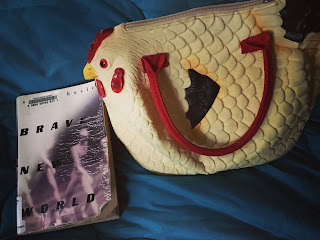Parable of the Sower
Octavia E. Butler
Hachette Book Group
1993
This novel has been on Ms. Hen’s radar for a while. She put
it on her library list, and there has been a long wait for a significant amount
of time. Right at the beginning of the year, the library where she is a patron
mysteriously got several new copies of this book. On the book that she took
out, it’s stamped January 2020, which means that it just arrived. Ms. Hen
wondered why this was true, but she started reading the novel, and she figured
it out.
Ms. Hen believes that her library got new copies of this
novel because it says a lot about the world we live in today, and where we are
headed. It was published in 1993, and it takes place between 2024 and 2027. It
scared Ms. Hen. She didn’t want to read it at night because she thought it
would give her nightmares. It’s about a world where the United States’
infrastructure has crumbled, and people are starving and killing each other.
Some people have money, but they keep it to themselves. Corporations have
employees who are slaves and are only paid in company scrip. People have to fight
for food and also for survival.
A young woman, Lauren Olamina, lives in a walled
neighborhood with her family and their small community. They grow food and help
each other survive. Outside the walls, it’s not safe, people are fighting for food and murdering each other, stealing, and women are raped continuously. Behind the wall
the children learn to read and write at the school where Lauren’s stepmother, Connie teaches. Lauren is a sharer, which means she shares other people’s pain,
and this happened because her birth mother did drugs before she was born.
Lauren’s father is the preacher and the church is inside their house on
Sundays. The people respect him and their family. Lauren writes poetry about
the way she sees everything, and she wants to invent a religion called Earthseed
that helps people deal with the messed up world. Life is decent and bearable
until drug addicts come and burn down the neighborhood, break down the walls, and kill almost everyone.
This novel reminded Ms. Hen of some other things she has
read. The part about the neighborhood where Lauren lives reminds Ms. Hen of
paradise in the Bible, when Adam and Eve lived in peace before the apple was
eaten and they were banished to the ordinary world. The section where Lauren is
walking north with her group is reminiscent of THE GRAPES OF WRATH because the
people are poor and are traveling somewhere they think life will be better. And
also, the lists of things that the travelers buy and carry remind Ms. Hen
of the short story, “The Things They Carried.”
Ms. Hen thinks this is relevant today because of politics
and where it is moving, and the sharp line between the rich and the poor. The
country isn’t in this bad shape yet, but we could be getting there. It
frightens Ms. Hen that this novel might tell us where we are going.
Ms. Hen likes this novel, and she thinks it might be the
best book she has read so far this year. Not just for the story, the writing is
also exquisite. It’s only the beginning of the year, but she’s pretty sure that
this will make it to Ms. Hen’s Top Ten. Ms. Hen does not want to be a pessimist
and fear the future, but books like this make her think about the twisted way
the world works, and the downward spiral that we are taking.




